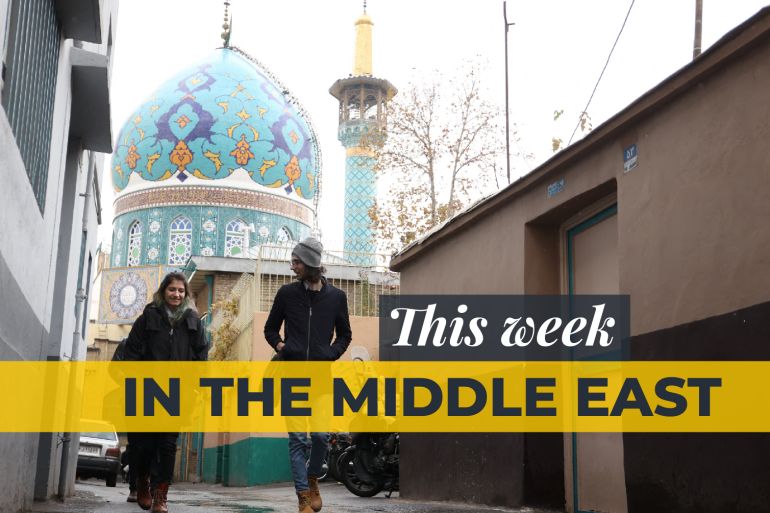Middle East round-up: Public hanging in Iran seen as message
Here’s a round-up of Al Jazeera’s Middle East coverage this week.

Iran’s protests explained, an exclusive interview with Tunisia’s ex-president on the state of democracy in the country, and why have Moroccan celebrations been met with a tough police response in Paris? Here’s your round-up, written by Abubakr Al-Shamahi, Al Jazeera Digital’s Middle East and North Africa editor.
On Monday, the Iranian judiciary announced a second execution linked to months of anti-government protests. Majidreza Rahnavard had been accused of a “terrorist” act and charged with moharebeh, which means “waging war against God”. Based on pictures published by the judiciary, he was hanged by the neck, in public, from a crane.
Keep reading
list of 4 itemsMorocco was the feel-good story we did not know we needed
Ex-Tunisian president warns of ‘Arab volcano’ ahead of elections
UN expels Iran from women’s rights body for protest crackdowns
The execution, so overtly displayed, is being taken as a sign that the Iranian authorities are doubling down on their attempts to end a protest movement that refuses to go away. Other protesters have been sentenced to death. More executions are expected.
[READ: FIFPRO ‘sickened’ by Iranian footballer death sentence reports]
The protests have been going on since mid-September, and over that time there have been a lot of developments. If you have a spare few minutes, I’d really recommend this look at the topic by my colleagues at Start Here. I have a hunch it will pretty much answer most, if not all, of your questions about what’s going on and why.
From democracy … to dictatorship?
Good news: Tunisia is holding parliamentary elections on Saturday.
Bad news: The opposition says it’ll just be the latest step in a return to one-man rule.
Hard to believe it’s happening in the place that inspired the Arab Spring uprisings. And yet, last year, President Kais Saied suspended parliament, which had been dominated by his opponents.
So, these latest elections will actually reconstitute the parliament — just without much in the way of an opposition. But are Tunisians happy with Saied’s presidency? Food shortages have been a problem for months now, and the economy is teetering on the edge of a crisis. Recent protests suggest many people have had enough of what they’re calling Saied’s coup.
There are few people better placed to ask about what exactly is going on in Tunisia than the first president to take office after the Arab Spring, Moncef Marzouki. Marzouki told me that Saied was part of the “counter-revolution”, but today, ultimately, he says an “Arab volcano” is waiting to erupt, not only in Tunisia, but across the wider region.
Moroccans in Paris
The Morocco love-in remains alive and well after their valiant loss against France. In the lead-up to Wednesday night’s decisive knockout match, Moroccan fans all over Africa, the Arab world and elsewhere celebrated with abandon — everywhere, it would seem, except certain parts of Europe.
In Paris, home to tens of thousands of Moroccan nationals and French Moroccans, celebrating fans have been unceremoniously met with tear gas, while in Spain women supporting their team were set upon by police swinging truncheons.
So, why is it that this crowd trouble is only happening in certain cities? North African football writer, Maher Mezahi, explains it for us.
And Now for Something Different
Juanro Aguiló has been drawing crowds outside stadiums during the World Cup in Qatar. The Chilean is an accomplished freestyle footballer, with an impressive repertoire of skills that I can guarantee, if I was silly enough to try to emulate, would have me landing flat on my face in no time. Aguiló has accomplished what he has while also having to cope with a condition known as phocomelia syndrome — the cause of his underdeveloped right arm and a missing left arm. “Be happy with what you have,” he says, “and look at the bright side of life.”
In Brief
Israeli forces kill 16-year-old girl in occupied West Bank raid – Tunisian president must be held accountable, says advocacy group – ISIL fighters in Syria killed in US raid – Israel elects a Knesset speaker as Netanyahu moves closer to forming government – Saudi foreign minister says “all bets off” if Iran gets nuclear weapon– Libyan man suspected of building 1988 Lockerbie bomb held in US custody – Irish soldier killed in attack on UN convoy in Lebanon
[READ: Why has the mayor of Istanbul Ekrem Imamoglu been sentenced to prison?]
World Cup joy
Aida Alami says she’s used to her beloved Moroccan national football team losing. But that’s changed, replaced by, in the words of the Moroccan journalist, “Africans and Arabs dancing, singing and celebrating being together”. Coach Walid Regragui for minister of happiness.
Quote of the Week
“[Women in Tunisia are] suffering from a sheer lack of protection … Many guarantees have not been delivered on.” — Kenza Ben Azouz, research fellow at Human Rights Watch, and author of a report that says Tunisian law fails to protect women from domestic violence.